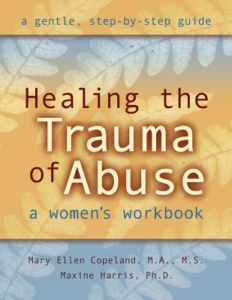
Depression
Women in abusive relationships often experience depression
Depression appears to occur two times more frequently in women than men
Depression is categorized by ongoing sense of hopelessness
Depression is a widespread problem that can be treated
Depression can be seen as a gift
There are so many ways that depression can be defined, however we are going to look at the feelings of sadness and loneliness, withdrawal from people and activities, physical discomfort, and loss of pleasure.
Symptoms of depression include: physical problems, changes in behavior, and different feelings and thoughts. Remember that each of these can overlap in symptoms.
| Physical Problems | Behavioral Changes | Thoughts and Feelings |
| Chronic Fatigue | Appetite Changes | Indecisiveness |
| Lack of Energy | Irritability | Emotional emptiness |
| Sleeping disturbances | Neglect of Appearance | Feelings of Hopelessness |
| Unexplained headaches | Concentration problems | Feeling highly self-critical |
| Digestive Problems | Loss of sexual desire | Feeling overwhelmed |
What does it feel like when someone repeatedly tries to have power and control over what you think and do?
What does it feel like when you are isolated or kept away from family and friends?
How do feelings of craziness, confusion, and anger relate to depression?
What is it like to usually put other people’s needs ahead of your own needs?
Feeling depressed is a normal response to not being or feeling in control, or in charge of one’s own life. There is a significant link between abuse and depression for women/men who have experienced abuse. Powerlessness is a devasting feeling. As a victim of abuse, we often feel powerless at some point in time, and it is difficult to overcome depression on your own when you feel powerless.
Coping with depression: Things I like to do:
| When I am alone | When I am with someone else |
| 1 | 1 |
| 2 | 2 |
| 3 | 3 |
| 4 | 4 |
| 5 | 5 |
Depression as a gift can been seen in many different ways, and it might seem strange to view depression as a gift. But often times we find that there are times we have a better understanding of our surroundings, wants, needs and how it influences those around us.
| · Increased attention to spiritual life |
| · More empathy towards others |
| · Greater depth of emotional experience |
| · Opportunity for truths to emerge |
| · Awareness of pressures on oneself |
| · Greater acceptance of oneself |
How do we deal with depression?
Depression varies in severity and type: everyone will experience different types of depression along with different symptoms, if you feel you are experiencing depression contact your primary care provider.
Talk to your support system that you have in place, if you feel that you can not talk to your support system, find an outlet for you to express your feelings and concerns.
Having depression is nothing to be ashamed of. A lot of people will keep their experience with depression quiet and not let those around them know that they experience depression, however it is also good to let your family and friends know that you experience anxiety or depression or both, as this will help them to know when you may have an attack and how to properly help you.
Perfectionism, unrealistic expectations, abusive and punitive self-directed statements, overachievements, lack of permission to feel, and competitive lifestyles could be related to depression. Talk about how our internal voice can become when we see ourselves not good enough or less than other people. Self-acceptance is key in dealing with depression.
